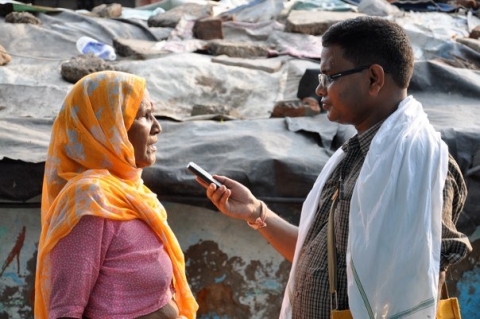
Even in the most remote tribal regions of India – where indigenous people have almost no access to mainstream news in a language they can understand, where almost all communication is done by word of mouth – it doesn’t take long for citizens to learn about a simple tool that gives them a new kind of power to improve their own lives and the lives of those around them. From community to community, word has spread that a quick cell phone call can lead to food deliveries for hungry children, government investigation of police brutality, payment for workers, even access to needed medications.
Knight International Journalism Fellow Shubhranshu Choudhary developed the cellular news network known as CGNet Swara, or Voice of Chhattisgarh. “Until we launched CGNet Swara, millions of people in these remote regions had no recourse if someone didn’t pay for work that was done, if government supplies were not delivered, or for the scores of other problems that occur when there is no system of accountability,” said Choudhary. “Now, with roughly 200 calls coming in every day, we routinely hear from those who’ve filed reports that people have finally been paid, supplies have been delivered, problems have been addressed and resolved.”
When he became a Knight Fellow, Choudhary realized that most of the indigenous people in India’s Chhattisgarh region had no access to newspapers, television or radios that broadcast in their native languages. Most of the villages, though, had at least one cell phone, so he developed a system and trained the villagers to send and receive news reports over the phone in their own native tongue. Once news reports are confirmed by professional journalists, they are distributed by cell phone. Choudhary also posts the reports online in both English and Hindi. Mainstream media outlets have started using the system as a resource for news about the tribal districts. Often, those who listen to the reports become activists who push for change.
Some recent results:
- After a report that two health centers in Jashpur, Chhattisgarh, had been closed for the past two years, listeners complained to the chief medical office. Now, one center has reopened.
- Another citizen from the same region reports medicine is now being sent to the area to treat people suffering from malaria.
- A human rights commissioner has visited Pampapur, Chhattisgarh, to conduct an investigation after a villager reported that he could not pay doctors to treat his son because the government had not paid his wages.
Now Choudhary is expanding the service. He’s just wrapped up another filled-to-capacity workshop for citizen journalists eager to make their voices heard. This time, the majority of participants were from the tribal districts of Orissa, on the east coast, historically a desperately poor area with nearly half of its 80-million residents living well below the poverty line.
Choudhary says it’s exciting to see people begin to understand the power they have. “Many of the workshop trainees quickly realize the potential for communicating important information in a way they’ve never been able to do before. They understand the power it brings to hold people accountable and they begin to get excited. You can feel the enthusiasm spreading across the room.”